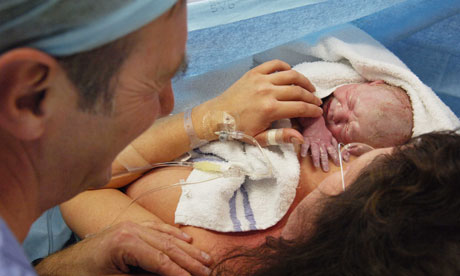
I have had four babies: one by caesarean, three vaginally. The caesarean was at 28 weeks after I got pre-eclampsia and almost died; the next birth was in hospital, after I tried to get a home birth on the NHS and was told I was "high risk" because of the previous c-section.
In my last two pregnancies I paid an independent midwife to attend my deliveries at home. The births were easy and not overly painful, and I consider the money I paid her the best investment I've ever made – notwithstanding the fact that, last time, the birth was so quick and straightforward the baby arrived before the midwife had reached our front door.
You probably didn't want to know all that: but chances are you will know it one way or another. Life experiences don't come much more significant than the birth of our children – whether we're the mother giving birth, or the father witnessing his child's arrival into the world.
Most of us only do it once or twice (I'm in a small minority as a mother of four), and how it works out influences, hugely, what we say about it and do about it and how we think about it ever after. And it influences us whatever our place in the debate – whether we're midwives or NHS managers or obstetricians or childbirth educators or just interested journalists like me.
Even if we try to keep it to one side, someone sooner or later will ask: "What happened to you?" Just saying I had two home births pigeonholes me; say you opted for an epidural, still more a caesarean, and you'll be pigeonholed too. All of this matters crucially in the childbirth debate right now, because the current problems of the UK maternity services cut deep – so deep that no one who is experiencing pregnancy now, or who has experienced it in the past two decades or so, will have managed to escape second-rate care, at least at some point.
The problem reaches its zenith with caesarean sections. Women who have not been properly cared for, not been properly listened to, not been given the chance to voice their fears or to make their choices, end up being dragged along on a conveyor belt that's out of their control; and all too often it ends with a caesarean section.
Reflecting back – not just in the days and months after the delivery, but in the years after it too, and through their work if that brings them into contact with health issues – they often conclude that, in an experience where control had been wrenched from them, the caesarean had at least felt safe and controllable, and that it had brought forth the baby at last. And so that's what they say, and that's what they think, and – if they're medical people – that's what they act on, too.
The National Institute for Health and Clinical Excellence (Nice) guidelines haven't given women the automatic right to demand a caesarean, but whose agenda was it that pushed the many recent newspaper stories predicting that it would do just that? And in the debates that have taken place at Nice over recent months, how many heated discussions will have seen reference to personal experiences (spoken or unspoken)? If the answer genuinely is none of them, I'll eat my placenta (which, as it happens, I didn't).
The personal is political – we all know that. But there aren't many subjects where the personal weaves quite such an emotional thread through the policies.
There aren't many issues where people (women and men) find it quite so hard to separate the choices they made from the choices they're suggesting others should make. There aren't many experiences where simply naming the choices you yourself made can be interpreted as inherent criticism for the choices the person standing next to you made (and where they'll feel that criticism, even if they don't really feel, deep down, that they were choices at all).
Is there a solution, in such an imperfect obstetric world? Of course there is, because we can be more self-aware. We can listen – properly – to other points of view, regardless of our own experience and viewpoint.
We can all be aware of how deficient the current maternity services are, and – though nothing is perfect – we can try to imagine what a better way of organising childbirth might look like.
And if we have influence in the world of birth, we can get over ourselves: unpack our experiences, learn from them, and be stronger not from pushing them out there, but from working through them.

